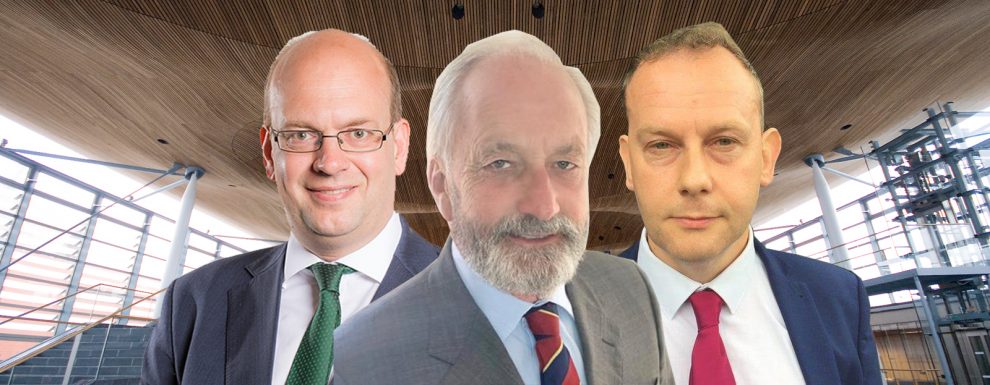- Bennett proposals would ‘entrench inequality’
- Hamilton rejects teaching of man-made climate change
THEY could be described as ‘the usual suspects’.
They are the tiny rump of former UKIP Senedd members who intervene in the Senedd to rant about their pet peeves have collectively confused fame with notoriety.
No position is too unarguable that the trio of Neil Hamilton, Mark Reckless, and Gareth Bennett will not try to shoot it down.
In the debate on the new Welsh National Curriculum which took place this Tuesday (March 2), each distinguished themselves. Not by the quality of their contributions, but more by how out of step they were with both reality and realpolitik.
Plaid Cymru’s North Wales MS Llyr Gruffydd moved an amendment to the curriculum bill to ensure that Wales’ future pupils received education on climate change and its causes.
Cue the outrage from Neil Hamilton.
Not only does Mr Hamilton reject the idea that Welsh children should learn about climate change, but he also rejects climate change’s existence.
Climate change is an established scientific fact. But that did not stop the sole remaining UKIP Senedd member from jumping in to object to Llyr Gruffydd’s amendment.
It’s worth pointing out that Mr Hamilton has form on environmental issues. In 1984, he argued there was no evidence that leaded petrol was damaging the environment. The intervening 36 years have proven him wrong.
Nevertheless, on ploughed Neil Hamilton.
There is, Mr Hamilton claimed: There is, in fact, hotly disputed debate going on amongst academics and others who are well versed in the theory of climate change.”
There isn’t.
He continued immoderately: “We’re not dealing with something here that is dogmatic truth; we’re dealing with a subject in which there is very, very considerable uncertainty and theorising. Most of the theories are based, of course, upon computer models, and computer models work on the principle of garbage in and garbage out.”
Which is plain wrong.
Comparing climate change to the media-generated concern about the Millennium Bug and the fears of some devout the world would face apocalypse at the end of the first millennium, Mr Hamilton opined: “There is, amongst a very tiny minority of people, climate anxiety.”
Maybe in rural Wiltshire or among the members of Mr Hamilton’s tiny party, but not elsewhere.
“Nobody denies, actually, that there is global warming going on,” he conceded, “but what’s the cause of it is something that is hotly disputed (it’s not) and it’s that debate, I think, that we should be teaching in our schools today, not teaching people what is pure propaganda in my opinion and representing that as indisputable fact. You’ve only got to look at the literature, you’ve only got to look at the lustrous names that are associated with the political views that I’m putting forward today, to see that there’s a serious debate there (there isn’t) and that’s what true education is about.
Taking the epoch-wide view of the climate, Mr Hamilton is undoubtedly true when he says the world is subject to constant climate change. What he does not account for, however, is the speed of current and ongoing climate change. In the centuries since the Industrial Revolution, and especially in the years since the end of the Second World War, climate change has accelerated at an unprecedented rate.
The consequences of rapid sea-level rises caused by climate change are already being felt around the world. Weather patterns are shifting and Wales is not immune from the consequences of those shifts.
In the past, species had time to evolve to climate change because it happened over centuries, if not millennia, and not over decades.
But the terrible trio was not done.
Former UKIP leader Gareth Bennett took his turn to intervene in the debate on Welsh language provision in education.
You could not describe Mr Bennett as having a bee in his bonnet. It’s a hornets’ nest.
And its occupants are all stinging him at once.
Mr Bennett’s opening gambit was daring.
Attacking the Welsh Government’s long-term target to create a nation that speaks its own language by 2030, Mr Bennett took the short-term view.
“If we waste money on an all-Wales policy designed to hit some arbitrary target of 1 million Welsh speakers, because ultimately what does having 1 million Welsh speakers actually mean? What does it actually mean if you teach 1 million people to say ‘bore da’ and ‘noswaith dda’? Is that actually a meaningful achievement and is it useful employment of limited resources? Is it better to get all those people to be able to smile and say ‘bore da’ and not much else?”
Mr Bennett’s solution to his own proposition was radical.
Children should be taught less Welsh, not more. And instruction in the Welsh language should be confined to those areas in which Welsh was the daily language of communication.
Creating Welsh-speaking enclaves and cutting the number of children educated in Welsh is a proposition designed to provoke dissent and division.
No matter how Mr Bennett phrased his views, his amendments – supported by Mark Reckless – would’ve left Welsh language education in pretty much the position it was in the 1970s and 1980s.
His English-centric view of Welsh education received short shrift from Kirsty Williams, who pointedly observed the proposals were advanced ‘under a veneer of equality’
The Minister continued: “Those of us that understand the language know that we aren’t dealing with two languages that are spoken by equal numbers, and the amendment will entrench the already existing inequality between our two national languages and deprive our children—deprive our children—of their birthright, the ability to speak both.
“It also goes against the evidence of experts in language acquisition. It is vitally important that learners, especially those in English medium, are given a secure foundation in Welsh, and that’s why we have made Welsh mandatory from age three.”
Mrs Williams was preaching to the choir.
Mr Bennett’s wrecking amendments were overwhelmingly defeated, supported only by himself and three others of his former UKIP colleagues.
It’s two months until the Senedd elections. If the polls run true, the voices of dissent for dissent’s sake will not be present in the Sixth Welsh Parliament. There may be new ones, but their influence will be as marginal – if not, more so – as those of Gareth Bennett, Mark Reckless, and Neil Hamilton. It might make for a less colourful Senedd. It will almost certainly make for one which better reflects Wales and not Wiltshire.


















Add Comment